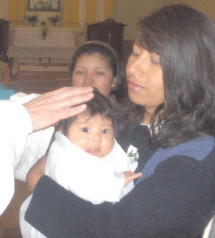Why is the United States Rich?
(Homily for Eighteenth Sunday in Ordinary Time, Year A)
After returning to the United States, I still have Peru on my mind, especially a conversation with a group of Peruvian doctors. They told me about the range of problems they see in their patients - physical, emotional and social difficulties which are often related to economic troubles. Then one of the doctors asked this question: Why is Peru poor and the United States rich? After twenty-five years going back and forth between the U.S. and Peru, I have heard lots of theories, but no real answer.* Still, it seems to me there is a deeper question: Why is anyone poor?
Considering Peru's abundant resources and relatively small population, its poverty is paradoxical. By comparison we Americans enjoy enormous wealth, yet few of us say we have enough. My own generation possessed much more than our parents did, yet we said we could not afford children.
Today's readings address this paradox. Isaiah speaks about the abundance which God provides - grains, wine, milk - enough to satisfy everyone. Still, we are not satisfied. Like Jesus' disciples, we fear hunger; we want to send needy people away, get them out of our sight. Jesus takes a different approach. He gives thanks to the Father, blesses the bread, breaks it and distributes it. With Jesus there is more than enough for all.
There is a great mystery here. Somehow the prosperity of an individual, a family, a nation is tied to Jesus' command, "give them some food yourselves." That is, trusting in the Father's abundance and sharing what we have with others. When we celebrate the Eucharist, we imitate the actions of Jesus - thank, bless, divide and share:
All you who are thirsty,
come to the water!
You who have no money,
come, receive grain and eat;
Come, without paying and without cost,
drink wine and milk!
**********
*Theories range from Darwinism, which posits the superiority of Northern races, to Marxism, which analyzes structures of injustice, to neo-capitalism, which seeks to remove market restraints, to old fashioned Calvinism, which identifies hard work, early rising, thrift, marital fidelity, etc. as signs of divine election. Most Americans - at least those who belong to the Middle Class - subscribe to some form of Calvinism, "Well, I worked hard for what I have." That view has some truth, but the problem is that one can easily point to many people who worked equally for what they don't have!
Spanish Version
From Archives (for Eighteenth Ordinary Sunday, Year A):
2008: Come to the Water
2005: Why is the United States Rich?
2002: All You Who Are Thirsty
Other Homilies
Seapadre Homilies:
Cycle A, Cycle B, Cycle C
Bulletin (Vandalism of St. Michael Statue, Birthright Satellite at Holy Family, Sexual Common Sense)
Announcements
Pictures from Peru (July 2005)

Why I Returned to the Catholic Church by Al Kresta
from Bill Donohue
imagine reading, ‘Ruth Bader Ginsburg, a Jew, helped write a legal brief’ for the ACLU upholding Roe?.’
And speaking of cultural anti-Catholicism, take a look at
what Amazon.com includes in the its Catholicism category
INDUCED ABORTION (IA) AND BREAST CANCER RISK: A POPULATION-BASED STUDY IN CHINA. *D-K. Li, E. Gao, J. Wu, Z. Zhang, L. Liu, and L. Herrinton. (Division of Research, Kaiser Foundation Research Institute, Oakland, California):
To determine whether IA increases breast cancer risk, the authors conducted a population-based case-control study in Shanghai, China where IA is not stigmatized and a history of IA can be verified through the family planning records.
National Geographic July 2005 article on Stem Cells:
One Culture They Fear Investigating
Journalistic Ethics (Terry Mattingly & Kenneth Woodward)
Slaves of the Third Millennium "The report starts by defining the concept of forced labor. It is not to be confused with poor working conditions or substandard wages. Rather, the ILO considers that two elements are involved in forced labor: the work or service is exacted under the menace of a penalty; and it is undertaken involuntarily."
Doubting Darwin (the Time magazine article)
Home

